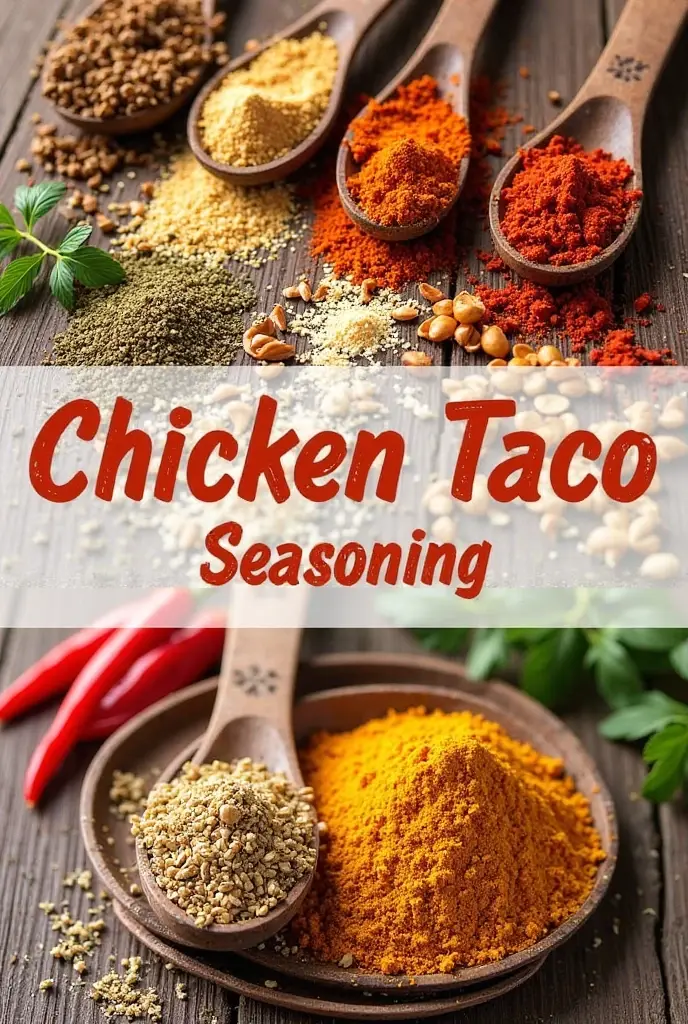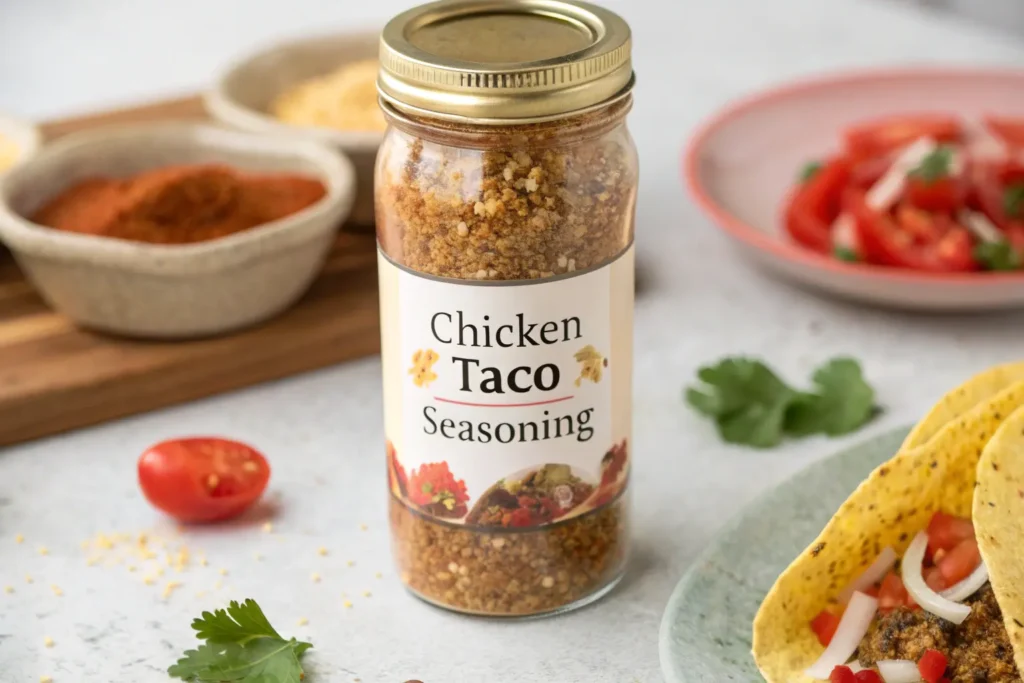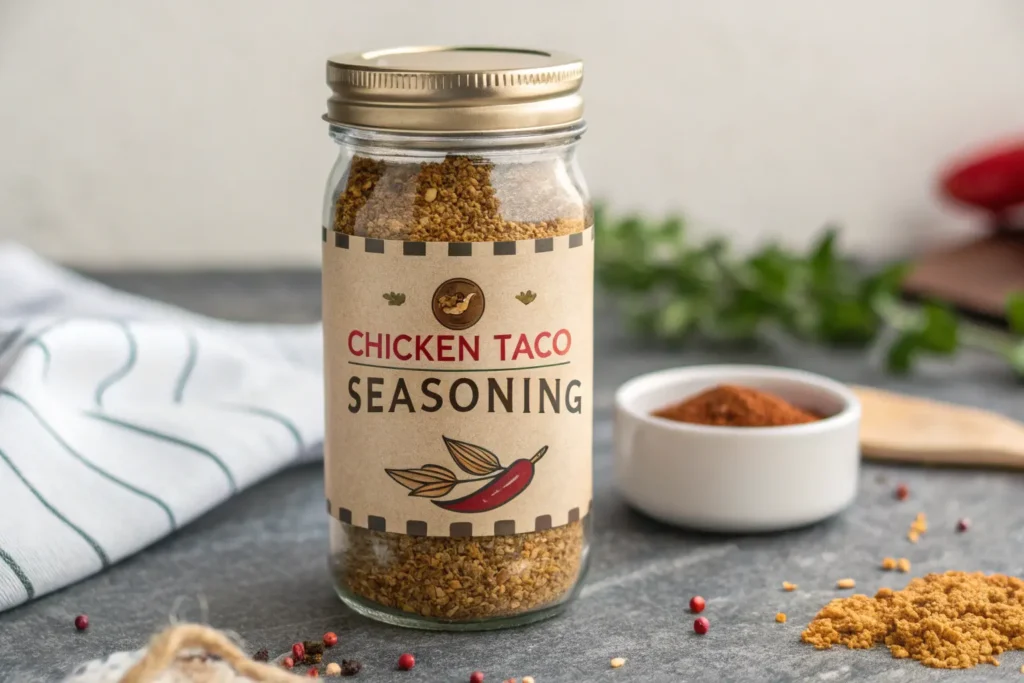Physical Address
304 North Cardinal St.
Dorchester Center, MA 02124
Physical Address
304 North Cardinal St.
Dorchester Center, MA 02124

Picture this scenario: you’re standing in your kitchen on a busy weeknight, craving those vibrant flavors that make taco Tuesday special. You reach for your usual seasoning packet, only to discover an empty pantry shelf staring back at you. Sound familiar? Here’s the game-changing truth—creating restaurant-quality chicken taco seasoning requires nothing more than spices already sitting in your cabinet.
Your journey toward flavor mastery starts right now. Instead of depending on store-bought packets filled with preservatives and mystery ingredients, you’ll discover how five straightforward steps transform ordinary spices into extraordinary taste experiences. Tonight marks the beginning of your family’s new favorite tradition.
Those convenient little packets lining grocery store shelves carry secrets manufacturers don’t advertise. Commercial seasoning blends typically contain 30-40% more sodium than necessary, plus artificial preservatives like silicon dioxide and calcium stearate. Your homemade version eliminates these unnecessary additives while delivering fresher, more vibrant flavors.
Consider the financial impact too. Each store-bought packet costs roughly $0.89 and seasons about one pound of chicken. Your homemade blend costs approximately $0.15 per serving—that’s a whopping 83% savings per use.
Creating your own seasoning blend puts you in complete control of every ingredient touching your family’s food. You decide the sodium levels, eliminate artificial preservatives, and ensure freshness that packaged alternatives simply cannot match.
Fresh spices contain higher concentrations of beneficial compounds like antioxidants and essential oils. Ground cumin, for instance, provides iron and aids digestion, while paprika delivers vitamin A and capsaicin for metabolism support.

Success begins with quality ingredients. Your essential spice collection should include:
| Ingredient | Amount | Purpose |
|---|---|---|
| Chili Powder | 2 tablespoons | Provides warm, earthy base flavor |
| Ground Cumin | 1 tablespoon | Adds smoky, nutty depth |
| Paprika | 1 tablespoon | Contributes color and sweet smokiness |
| Garlic Powder | 1 teaspoon | Creates savory foundation |
| Onion Powder | 1 teaspoon | Balances with natural sweetness |
| Dried Oregano | 1 teaspoon | Introduces herbal complexity |
| Salt | 1 teaspoon | Enhances all other flavors |
| Black Pepper | ½ teaspoon | Provides gentle heat |
| Cayenne Pepper | ¼ teaspoon | Delivers adjustable spice level |
Pro Tip: Check expiration dates on your spices. Ground spices maintain peak potency for 2-3 years, while whole spices last 3-4 years.
Proper blending ensures consistent flavor distribution throughout your seasoning. Start by combining larger quantities first—chili powder, cumin, and paprika form your base. Add remaining ingredients gradually, whisking between additions.
Use a fine-mesh sieve to eliminate any clumps. This extra step guarantees smooth, even coating on your chicken. Transfer your finished blend to an airtight container, leaving some headspace for easy shaking.
Here’s where amateur cooks separate from seasoning masters. Toasting your spice blend amplifies aromatic compounds and deepens flavor complexity. Heat a dry skillet over medium-low temperature for 30 seconds. Add your seasoning mixture, stirring constantly for 60-90 seconds until fragrant.
Watch carefully—burnt spices turn bitter quickly. You’ll notice the aroma intensifying as essential oils activate. Remove from heat immediately when you detect the enhanced fragrance.
Your seasoning-to-chicken ratio determines flavor intensity. Use 2-3 tablespoons per pound of chicken, depending on your preference. For optimal penetration, season chicken 30 minutes before cooking, allowing time for flavors to penetrate the meat.
Create an even coating by patting chicken dry first, then massaging seasoning into all surfaces. Don’t forget to season both sides of chicken breasts or thighs.
Temperature control makes the difference between good and exceptional results. Preheat your cooking surface—whether skillet, grill, or oven—before adding seasoned chicken. This initial sear locks in juices while creating attractive color.
Cook chicken to an internal temperature of 165°F, using a meat thermometer for accuracy. Allow cooked chicken to rest 5 minutes before slicing, redistributing juices throughout the meat.
Adjust spice intensity by modifying cayenne pepper quantities:
Transform your base recipe with these regional twists:
Tex-Mex Style: Add 1 teaspoon smoked paprika and ½ teaspoon brown sugar California Fresh: Include 1 teaspoon dried lime zest and reduce salt to ¾ teaspoon Mexican Street Taco: Incorporate ¼ teaspoon coriander and extra oregano
Proper storage extends your seasoning’s lifespan significantly. Store in airtight containers away from heat, light, and moisture. Label with preparation dates—homemade blends maintain peak flavor for 6-12 months.
| Storage Method | Shelf Life | Best Practices |
|---|---|---|
| Room Temperature | 6-12 months | Cool, dark pantry location |
| Refrigerated | 12-18 months | Moisture-proof container |
| Frozen Portions | 2-3 years | Small batch containers |

Your versatile blend works magic beyond traditional tacos. Try these applications:
How much chicken taco seasoning should I use per pound of chicken? Use 2-3 tablespoons of homemade chicken taco seasoning per pound of chicken. Start with 2 tablespoons for milder taste, increasing to 3 for bolder flavor profiles.
Can I make chicken taco seasoning without salt? Absolutely! Omit salt from the blend and add it separately during cooking. This approach gives you complete sodium control and accommodates various dietary needs.
How long should I marinate chicken with taco seasoning? Marinate seasoned chicken for 30 minutes to 4 hours for optimal flavor penetration. Longer marinating times may result in overly salty results.
What’s the difference between chicken taco seasoning and regular taco seasoning? Chicken taco seasoning typically contains more herbs like oregano and less aggressive chili powder, as poultry benefits from lighter, more aromatic spice profiles compared to beef.
Creating homemade chicken taco seasoning revolutionizes more than just your weeknight dinners—it transforms your entire approach to flavor development. These five straightforward steps unlock customization possibilities that no commercial packet can deliver. You now possess the knowledge to create bold, restaurant-quality seasoning at a fraction of store-bought costs.
The perfect chicken taco seasoning reflects your family’s taste preferences. Start with this foundation recipe, then make adjustments based on your flavor journey. Experiment with heat levels, explore regional variations, and trust your palate to guide modifications.
Every time you choose your homemade blend over commercial alternatives, you’re selecting quality, health, and incredible flavor. Your spice cabinet has become your secret weapon for creating memorable meals that spark conversation and requests for seconds.
Ready to transform your taco nights forever? Gather these common spices from your pantry, follow these five simple steps, and discover why homemade chicken taco seasoning creates flavors that keep families gathering around your dinner table. Your first batch awaits—and your taste buds will thank you for taking this flavorful leap.